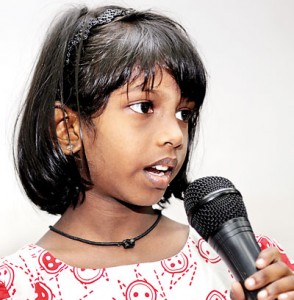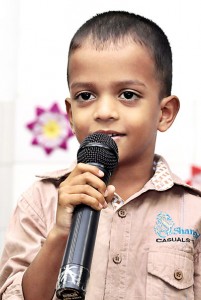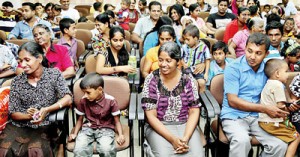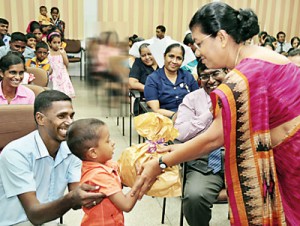Survivors turn stars

The young performers: Some were pros, others a little anxious. Pix by M.A. Pushpa Kumara
Some are born performers singing, dancing, speaking with confidence and one even playing the violin, while others are overtaken by stage-fright and stand frozen, with anxious mothers attempting to coax them gently to do their piece.
But each and every one gets loud applause not only from parents but also doctors, nurses and other staff as well as a gift to take home with them.
The smiles of satisfaction of the doctors who have left behind their stethoscopes and nurses their thermometers and charts say it all.
For, these were the little ones that the Neonatal Intensive Care Unit (NICU) of the Lady Ridgeway Hospital (LRH) for Children in Colombo nurtured to give them a fighting chance to survive. The concert by the “graduates” of the NICU, which is headed by Consultant Paediatrician Dr. Ramya de Silva, was to celebrate World Prematurity Day on November 27.
It was also a celebration of life itself, for of the 345,000 babies born annually in Sri Lanka, 5% (17,250) are premature. The neonatal (first four weeks of life) mortality rate is 6.1 per 1,000 live births. Prematurity causes 35% of neonatal deaths; 72% of infant deaths; and 80% of deaths of under-five-year-olds.
The implications of being born prematurely extend beyond the neonatal period and throughout the lifecycle. Many survivors face a life-time of disability including cerebral palsy, learning disabilities, chronic lung disease and visual and hearing impairment. They are also at greater risk of developing non-communicable diseases such as hypertension, diabetes, obesity and other significant health conditions, it is learnt.
On that Thursday, though, the unifying factor among parents from all over the country, irrespective of race and religion, were the “stars” on the stage of the LRH auditorium and in the audience.

Proud day for parents and children alike
Gehani who was 1.2gm at birth had been in the NICU for 25 days, Poorna Rashmith weighing 780gm when born at 27 weeks had been looked after for two weeks, Lithara weighing 735gm born at 28 weeks had been there for a month, Mohamed though weighing 3kg at birth had been admitted with severe illness, Janani Amalshi born at 33 weeks had spent three weeks under the care of the NICU staff and the list goes on.
While the concert is on, a message of hope that the LRH NICU is looking beyond its mandate of caring for those who come to its doorstep, is also held out. It was last year that ‘neonatal retrieval training’ was held at the LRH in a pilot project funded by the World Health Organization to assess and use the resources available to a maximum, to give even very ill newborns a chance at survival.
The Sunday Times of June 9, 2013 reported this in an article titled ‘Now even the tiniest baby has a fighting chance to live’. The training was

Dr. Ramya de Silva hands over a gift to a little one
organised by the Perinatal Society of Sri Lanka in collaboration with the Family Health Bureau under the guidance of three experts from the United Kingdom.
The neonatal retrieval concept covers how premature and critically-ill newborns at peripheral hospitals who need specialised care at a tertiary hospital such as the LRH, would be transported in special ambulances. These ambulances are equipped with incubators fitted with mechanical ventilators, infusion pumps and monitors that can be used in a mobile scenario. This type of transport system would attempt to provide a neonatal intensive care unit environment with uninterrupted care, it is understood.
Dr. Ramya de Silva’s contention is that although a significant number die due to congenital defects which regrettably cannot be changed, 28% or more of the babies who die in the first week of birth are pre-term babies. A strategy is needed to save them.
Hope is held out during the concert for parents of pre-mature babies, who may not have been fortunate earlier, that the Neonatal Retrieval Programme is to be implemented next year.


